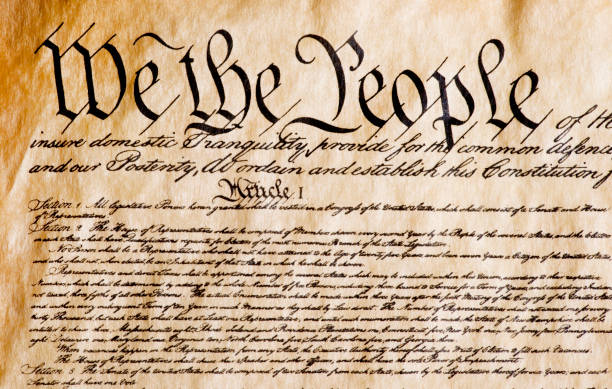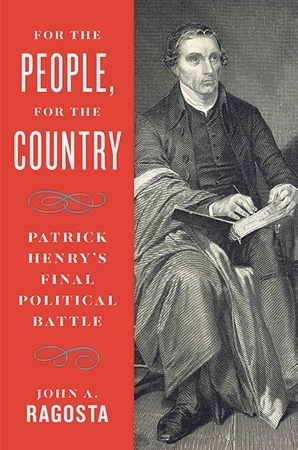The Rules for a Democracy – And How the Founders Struggled with Them
John Ragosta, Historian at the Robert H. Smith International Center for Jefferson Studies at Monticello, has taught law and history at the University of Virginia, George Washington University, and Hamilton, Oberlin, and Randolph Colleges. He is the author of Religious Freedom: Jefferson’s Legacy, America’s Creed (UVA Press, 2013), and Wellspring of Liberty: How Virginia’s Religious Dissenters Helped to Win the American Revolution & Secured Religious Liberty (Oxford University Press, 2010). He is co-editor of The Founding of Thomas Jefferson’s University (UVA, 2019). In this Thoughts From the Lawn blog, Ragosta discusses his newest book—For the People, For the Country: Patrick Henry’s Final Political Battle—in print from UVA Press this month.
We all know the first rule in a democracy: The majority rules.
But the second rule is equally important: The minority must accept majority rule, at least until the next election. Sadly, that rule has too often been forgotten.
In the 1790s, when the United States was new, those rules were still being tested. As the still toddling nation was buffeted with challenges from European wars resulting from the French Revolution, political in-fighting erupted. Hyper-partisanship flourished and confounded the Founders. Some resorted to political violence.
Political conflict escalated. In 1798, the Sedition Act was adopted, making it criminal to criticize the president or Congress or oppose the government. For years, historians told us that fourteen people were prosecuted under the Sedition Act, but more recent scholarship shows more than 40 indictments involving over 120 people. Opposition newspaper editors were targeted. Political dissent became dangerous. Without the ability to criticize the government and a vibrant free press, the electoral process itself was at risk. Thomas Jefferson was terrified of what he called a “reign of witches.”
In desperation, Jefferson and James Madison responded with the Kentucky and Virginia Resolutions, the former, written by Jefferson, threatened to “nullify” federal laws that a state concluded, unilaterally, were unconstitutional. Jefferson, fearing that tyranny loomed, even voiced the idea of secession. Several Virginia militia officers declared that if the United States was invaded by France, they would rally to the foreign banner rather than the U.S. flag carried by a political opponent. Newspapers across the country warned of “Civil War!”
George Washington, living in retirement, was appalled at the threat posed by Jefferson’s and Madison’s actions. Washington warned that anarchy or war threatened. He begged Patrick Henry, also in retirement, to run for political office to save the still new nation.
That request was telling. Henry had been the leading antifederalist in debates over ratification of the Constitution, opposing ratification because he thought the new government would be too powerful and distant from the people. He had warned that the government would interfere with people’s rights – just what seemed to be happening.

But Henry put country over party, nation over politics. When the Constitution was ratified over his objections, Henry told supporters that he would seek changes, but he would pursue those changes “in a constitutional way.” In 1795, Henry assured President Washington that “if my Country is destined … to encounter the Horrors of Anarchy, every power of Mind & Body which I possess will be exerted in support of the Government under which I live & which has been fairly sanctioned by my Country men. I should be unworthy the Character of a Republican or an honest man if I withheld my best & most zealous Efforts, because I opposed the Constitution in its unaltered Form….”
Now, reluctantly, Patrick Henry came out of retirement because he believed that the nation was threatened with civil war and disunion. Making his final political speech on March 4, 1799, at Charlotte Courthouse, he reminded the gathered throng that he had opposed the Constitution, but that the people – his countrymen – had adopted it. “[I]t was now necessary to submit to the constitutional exercise of … Power.” Henry reminded them that “WE the people” agreed – even though he had opposed. He explained that if we disagree with government policy, we must take it to the ballot box – not with states ignoring the federal government or nullifying federal laws, not with appeals to foreigners to intervene, not with violence, not with insurrections against the elected government – but to the ballot box. If we cannot live within the Constitution that WE adopted, Henry warned, “you may bid adieu forever to representative government. You can never exchange the present government but for a monarchy.”
In 1799, with the new nation on the precipice of partisan violence, anarchy, and civil war, hearing Henry’s and Washington’s warnings, Americans seemed to awake from the partisan-induced stupor and rallied to the union. The radical states’ rights agenda of the Kentucky and Virginia Resolutions was rejected, ten states rebuffing them, and Jefferson’s Democratic-Republicans, who seemed to threaten the union, suffered serious losses in congressional elections.
Chastened, Jefferson and Madison did what we hope politicians will do: They pulled-back from their more radical pronouncements. Within 10 days of adopting the Virginia Resolutions (that he had drafted), Madison wrote to Jefferson that perhaps they had gone too far. In the election of 1800, they changed tactics: Rather than pushing a radical states' rights agenda that threatened secession, they focused on the free press and unfairness (and unconstitutionality) of the Sedition Act.
Winning the presidency, Jefferson seemed to moderate. The allegation of hypocrisy that has plagued President Jefferson for over 200 years might be seen as Jefferson realizing that the hyper-partisanship of the 1790s almost destroyed the nation, that the union was, as he said in his first inaugural, the “sheet anchor of our peace at home, and safety abroad,” that what unites us – e pluribus unum – is more important than what divides us.
Patrick Henry died in June 1799. Had he lived, Jefferson almost certainly would not have been elected president. Instead, with Henry’s death (and Washington’s later in 1799) and Jefferson’s moderation, we became a Jeffersonian nation.
* * * * *
When I began to write For the People, For the Country: Patrick Henry’s Final Political Battle, I did not realize how directly Henry was speaking to us when he warned that if “We the people” cannot live within the government that we created, the alternative is tyranny. His demand that if we seek change, it must be done “in a constitutional way” is worth remembering, a principle that too many Americans have seemed to forget. His understanding that the minority in a republic must seek change at the ballot box is, indeed, one of the essential rules in a republic.

- A Revolution in the Air: The Wright Brothers Take to the Sky on December 17, 1903
- Musings on National Violin Day
- Making the Promise Real: How a UN Tax Convention Can Fulfill the UNDHR’s Vision
- UVA Club of Atlanta: Virtual Pilates Class
- UVA Club of Vietnam: J-Term Farewell Social
- UVA Club of Atlanta: UVA Women's Basketball at Georgia Tech